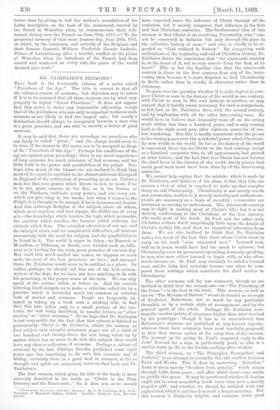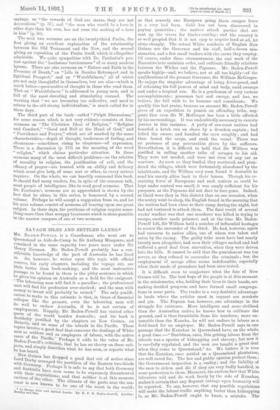DR. FAIRBAIRN'S SERMONS.* THIS book is the fourteenth volume of
a series called "Preachers of the Age." The title is correct in that all the volumes consist of sermons ; but objection may be taken if it is to be assumed that all these sermons are by what may properly be styled "Great Preachers." It does not appear that this series is under any responsible editorship, except that of the publishers, who can only be expected to choose such sermons as are likely to find the largest sale ; but surely a distinction should always be recognised between a man who is a great preacher, and one who is merely a writer of good sermons.
It may be said that there are nowadays no preachers who can fairly be called " great ; " and the charge would seem to be true, if the names in this series are to be accepted as those of the "Preachers of the Age." Perhaps the conditions of the age are against great preaching ; there is too much impatience of long sermons, too much tolerance of bad sermons, and too little faith in the power and possibilities of the pulpit. Per- haps, also, much of the blame—we are inclined to think that most of it—must be ascribed to the almost universal disregard in England of the cultivation of preaching as an art. Unless a man has that rare genius which knows no law, he must, if he is to win great success at the Bar, or in the Senate, or on the Platform, cultivate every power, and use every art, which can give wing to his words; but when it comes to the Pulpit, it is thought to be enough if he is decorous and devout. And this, although Religion is the subject, above all others, which most requires, and best repays, the skilful use of every aid,—the knowledge which teaches, the logic which persuades, the emotion which touches, the humour which enlivens, the rhetoric which fires. The extended education of our age, and its enlarged views, and its complicated difficulties, all increase enormously both the need for religion and the possibilities to be found in it. The world is eager to listen : no Bossuet, or Lssillon, or Tillotson, or South, ever wielded such an influ- ence as is waiting for the truly great preacher of our own day. Bat, until this much-needed one comes, we suppose we must make the most of the best preachers we have ; and amongst them, DI'. Fairbairn would seem to be entitled to a place. Or rather, perhaps, we should call him one of the best sermon- writers of the day ; for we have not here anything to do with his preaching, in the proper sense of the term. We can only speak of the volume which is before us. And the outside lettering itself compels us to make a criticism called for by a practice which is becoming much too common in volumes both of stories and sermons. People are frequently an- noyed on taking up a book with a striking title, to find that this title refers only to a small portion of the con- tants, the rest being described, in smaller letters, as "other stories," or "other sermons." So we hope that Dr. Fairbairn is not responsible for the fact that this volume is lettered so prominently, Christ in the Centuries, whilst the sermon on that subject only occupies seventeen pages out of a total of two hundred and twenty-three, the rest being taken up by matter which has no more to do with this subject than would have any chance collection of sermons. Perhaps a volume of sermons by the late Phillips Brooks, published some eight years ago, has something to do with this eccentric way of titling; certainly there is a good deal in common, so far as thought and spirit are concerned, between that book and Dr. Fairbairn's.
The first sermon, which gives its title to the book, is more correctly described in the inside as "Christ in the First Century and the Nineteenth ;" for it does not, as we should
* Christ in the Conturioa ; and other Sermons. By A. Af. Fairbairn, M.A., D.D„ Principal of Mansfield College, Oxford. London : Sampson Low, Marston, and Co. have expected, trace the influence of Christ through all the centuries, but it merely compares that influence in the first and last Christian centuries. The fundamental idea of this sermon is that Christ is an everliving Personality, who "can- not be construed in isolation but only through his place in the collective history of man;" and who is chiefly to be re- garded as "God realised in history." By comparing such realisations at the beginning and end of Christian history, Dr. Fairbairn draws the conclusion that "the nineteenth century is, at the heart of it, not so very remote from the first, at its heart." This is but the familiar idea that the nineteenth century is closer to the first century than any of the inter- vening ones, because it is more disposed to find Christianity in deeds rather than in creeds, in character rather than in ceremony.
To pass over the question whether it is quite logical to com- pare Christ as seen in the history of the world in one century, with Christ as seen in His own history, in another, we may remark that it hardly seems necessary, for such a comparison, to fall foul, as Dr. Fairbairn does, with the second century, and by implication with all the other intervening ones. He would have us believe that humanity went off on the wrong scent within less than a hundred years, and is only coming back to the right scent now, after eighteen centuries of use- less wandering. But this is hardly consistent with the imam in his closing pages over the wonderful power which Christian- ity now wields in the world. So far as the history of the world is concerned, there was no Christ in the first century, except as a fanatical carpenter who, to all appearances, had proved an utter failure; and the fact that this Christ has now become the chief force in the history of the world, surely proves that much good work must have been done by all the intervening centuries.
We cannot help saying that the mistake which is made by Dr. Fairbairn, and thinkers of his class, is that they take too, narrow a view of what is required to make up that complex thing we call Christianity. Christianity is not merely creeds and ceremonies, neither is it merely morality and enthusiasm: creeds are necessary as a basis of morality ; ceremonies are necessary as moving to enthusiasm. The nineteenth century may be right in making most of Christ's life ; but it is not thereby conforming to the Christians of the first century,. who made most of his death. St. Paul and the other early Christian writers dwell surprisingly little upon the details of Christ's earthly life, and draw no important inferences from them. We are also inclined to think that Dr. Fairbairn makes too much of the fact that those whom Christ chose to carry on his work "were unlearned men." Learned men, well on in years, would have had too much to unlearn ; but Christianity owes its permanent spreading, humanly speaking, to men who were either learned to begin with, or who after- wards became so. St. Paul may certainly be called a learned man, and St. John bad certainly become one when he com- posed those writings which constitute his chief service to Christianity.
The other sermons call for lees comment, though we are inclined to think that the second one—on "The Preaching of the Cross"—is the best in the book. This sermon, as well as one on "The Mission of Sorrow," seems to remind us strongly of Frederick Robertson, not so much by any particular thoughts, as by a certain style of arrangement, and by the general spirit of the whole. Perhaps Dr. Fairbairn occa- sionally reaches points of eloquence higher than were reached by his prototype : though it has to be remembered that Robertson's sermons are published as hap-hazard reports ; whereas these have evidently been most carefully prepared, so that they savour rather of the essay than of the sermon. The passage (p. 34) giving St. Paul's supposed reply to the Jews' demand for a sign, is particularly good, as also is a similar reply (p. 38) to the Greeks seeking after wisdom.
The third sermon, on "The Principles, Evangelical and Judicial," is an attempt to reconcile the old conflict between Faith and Works. This it does by narrowing " Salvation " down to mean merely "freedom from penalty," which comes through faith, from grace ; and after which must come works to justify this grace. It may be questioned whether Silvation ought not to mean something much more than such a merely negative gift; and whether we should be satisfied with any explanation which is not based on such a larger meaning. But this sermon is distinctly helpful, and contains many good sayings, as "the rewards of God are states, they are not decorations" (p. 57), and "the man who would be a hero in other days than his own, has not even the making of a hero in him" (p. 60).
The next two sermons are on the twenty-third Psalm, the first giving an excellent explanation of the relationship between the Old Testament and the New, and the second giving an exposition of the Psalm itself, which is altogether admirable. We quite sympathise with Dr. Fairbairn's pro- test against the "loathsome lusciousness" of so many modern hymns. There are also sermons on "Nature and Faith in the Presence of Death," on "Life in Secular Retrospect and in Spiritual Prospect," and on "Watchfulness," all of which are not only thoughtful in themselves, but are also—which is much better--provocative of thought in those who read them. That on " Watchfulness" is addressed to young men, and is full of the most elevating and stimulating counsel. The warning that "we are becoming too collective, and need to return to the old strong individualism," is much called for in these days.
The third part of the book—called "Pulpit Discussions," for some reason which is not very evident—consists of four sermons on "The Christian Ideal of Religion," "Religion and Conduct," "Good and Evil at the Hand of God," and "Providence and Prayer," which are all marked by the same characteristics,—depth of thought, tenderness of feeling, and chasteness—sometimes rising to eloquence—of expression. There is a discussion (p. 170) on the meaning of the word "religion," which claims particular attention. In these sermons many of the most difficult problems—as the relation of morality to religion, the justification of evil, and the efficacy of prayer—are treated with an ability and delicacy which must give help, of some sort or other, to every serious inquirer. On the whole, we can heartily commend this book. It should find many readers, for, in spite of the common talk, most people of intelligence like to read good sermons. That Dr. Fairbairn's sermons are so appreciated is shown by the fact that he alone, in this series, is honoured by a second volume. Perhaps he will accept a suggestion from us, and let his next volume consist of sermons all bearing upon one great subject. In these days, the problems of religion require some- thing more than that scrappy treatment which is alone possible in the narrow compass of one or two sermons.



































 Previous page
Previous page